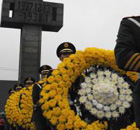Foreign and Military Affairs
President Hu comes to Central Asia with gift of books
By Wu Jiao (chinadaily.com.cn)
Updated: 2009-12-14 13:47
ASHGABAT: Wearing the typical southern Chinese tie-dyed clothes and big red flowers in their hair, waving traditional Chinese Shanzi (fans) painted in characteristic red, six girls sang the traditional Chinese song What a Beautiful Jasmine to Chinese President Hu Jintao.
The performance was presented for Hu when the Chinese president gave a list of books, mainly on Chinese culture and philosophy, to the Astana-based Confucius Institute cosponsored by the Kazakhstan Eurasian University and China's Xi'an International Studies University on Saturday.
With their cultures historically intervened with each other, China and its Central Asian neighbors have also been committed to further lift the cultural and personnel exchanges along with more trade and economic cooperation.
Hu, on a tightly scheduled visit to Kazakhstan and Turkumenistan over the weekend, has squeezed time out of his busy schedule to give thousands of books to those learning Chinese in the two countries.
Hu also announced the doubling of the number of students from Kazakhstan and Turkmenistan studying in China, which means that 100 Kazakhstan students and 90 Turkmenistan students are able to study in China with China state-funded scholarship every year beginning in 2010.
The students and teachers with the Confucius Institute said the performance itself provides a good opportunity to deliberate their achievement in Chinese learning.
"The gifts of books given by President Hu has greatly encouraged us ... It is so honored to perform for him," said a teacher with the institute called Nuer Ayi.
Meng Changyong, head of the Chinese Culture School with the Xi'an International Studies University, who has helped fund the Confucius Institute, told China Daily that with bilateral trade soaring and more China-funded investment flowing to Kazakhstan, the country sees a strong demand in Chinese language study.
More than 500 students have graduated from the institute since it was set up in December 2007, with courses mainly about Chinese culture and language.
Those who have performed well in the study will be granted opportunities to study in China, Meng said.
"Several students have come to advance their Chinese learning in China and come back to devote themselves to the Chinese teaching in their home country," Meng said.
The quota increase in the scholarship will certainly help to boost the bilateral cultural and social communications, according to those at the Confucius Institute.
Apart from visiting the Astana-based Confucius Institute, the president has sent a list of Chinese books illustrating Chinese culture, philosophy and pragmatic Chinese skills including Chinese acupuncture and traditional Chinese medicine to a local university.
The more than 1,000 books were selected for those students, Hu said.







